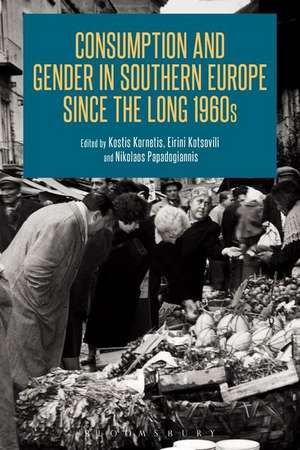Consumption and Gender in Southern Europe since the Long 1960s
Editat de Dr Kostis Kornetis, Dr Eirini Kotsovili, Dr Nikolaos Papadogiannisen Limba Engleză Hardback – 10 feb 2016
| Toate formatele și edițiile | Preț | Express |
|---|---|---|
| Paperback (1) | 181.10 lei 6-8 săpt. | |
| Bloomsbury Publishing – 10 feb 2016 | 181.10 lei 6-8 săpt. | |
| Hardback (1) | 716.63 lei 6-8 săpt. | |
| Bloomsbury Publishing – 10 feb 2016 | 716.63 lei 6-8 săpt. |
Preț: 716.63 lei
Preț vechi: 916.77 lei
-22% Nou
Puncte Express: 1075
Preț estimativ în valută:
137.17€ • 149.05$ • 115.30£
137.17€ • 149.05$ • 115.30£
Carte tipărită la comandă
Livrare economică 21 aprilie-05 mai
Preluare comenzi: 021 569.72.76
Specificații
ISBN-13: 9781472596277
ISBN-10: 1472596277
Pagini: 304
Ilustrații: 20 bw illus
Dimensiuni: 156 x 234 x 18 mm
Greutate: 0.59 kg
Editura: Bloomsbury Publishing
Colecția Bloomsbury Academic
Locul publicării:London, United Kingdom
ISBN-10: 1472596277
Pagini: 304
Ilustrații: 20 bw illus
Dimensiuni: 156 x 234 x 18 mm
Greutate: 0.59 kg
Editura: Bloomsbury Publishing
Colecția Bloomsbury Academic
Locul publicării:London, United Kingdom
Caracteristici
Analyses the 20th-century transitions from dictatorships to democracy in the Mediterranean in a social context through the lens of gender history
Notă biografică
Kostis Kornetis is Assistant Professor at the Center for European and Mediterranean Studies at New York University, USA. He is the author of Children of the Dictatorship: Student Resistance, Cultural Politics and the "Long 1960s" in Greece (2013).Eirini Kotsovili is Lecturer at the Hellenic Studies Centre at Simon Fraser University, Canada.Nikolaos Papadogiannis is Teaching Fellow at the University of St. Andrews, UK. He is the author of the book, Militant Around the Clock? Left-Wing Youth Politics, Leisure, and Sexuality in Post-Dictatorship Greece, 1974-1981 (2015).
Cuprins
List of illustrationsList of contributorsAcknowledgmentsTransliteration Preface - Guya Accornero (University Institute of Lisbon, Portugal) Introduction - Kostis Kornetis, Eirini Kotsovili, Nikolaos Papadogiannis PART ONEConsumption and Gender in Dictatorship and Disciplined Democracy 1. Gendering Touristic Spain, 1950s - 1970s - Moritz Glaser (University of Kiel, Germany)2. Basque National Identities, Youth Culture and Gender in the 1960s: Beyond the Farmhouse and the Ye-Yé - Amaia Lamikiz Jauregiondo (European University Institute, Italy)3. Consumerism, Gender Diversity and Moralization of Sexuality in the Iberian 1960s - Rosa M. Medina-Domenech (University of Granada, Spain) and Richard Cleminson (University of Leeds, UK)4. Gender and Consumer Behavior: A Portrait of Portugal in the 1960s - Inês Brasão (Polytechnic Institute of Leiria, Portugal)5. Tourism, Body and Seaside Recreational Practices in Postwar Greek Society until 1974 - Michalis Nikolakakis (Independent Scholar, Greece) PART TWOConsumption and Gender Through the Moment of Transition6. Representations of Sexuality and Gender in Portuguese Cinema During the Late Estado Novo and the Carnation Revolution - Érica Faleiro Rodrigues (Birkbeck, University of London, UK)7. The Spanish Housewives in Transition (1959-1980) - Elena Díaz Silva (University of Cologne, Germany)8. Documenting Post-Authoritarian Subcultures in the European South: The Cases of Pedro Almodóvar's Pepi, Luci, Bom and Nikos Zervos's Dracula of Exarchia - Kostis Kornetis (New York University, USA)9. 'Naked Piazza'. Male (Homo)Sexualities, Masculinities and Consumer Cultures in Greece since the 1960s - Kostas Yannakopoulos (University of the Aegean, Greece) PART THREEConsumption and Gender Between the Transition to Democracy and the Financial Crisis of the 2010s 10. Television Culture and Social Change in Post-revolutionary Portuga - Luís Trindade (Birkbeck, University of London, UK)11. Leafing through the 1980s in Portuguese Fashion Magazines - Giulia Bonali (Birkbeck University of London, UK)12. Consuming the Past as a Televisual Product: Gender and Consumption in Cuéntame cómo pasó/Tell Me How it Was - Abigail Loxham (University of Queensland, Australia)13. Audio-Visual Consumption in the Greek VHS Era: Social Mobility, Privatization and the VCR Audiences in the 1980s - Ursula-Helen Kassaveti (Aristotle University of Thessaloniki, Greece)14. Revisiting the Greek 1980s through the Prism of Crisis - Panagiotis Zestanakis (University of Crete, Greece)Bibliography Index
Recenzii
This timely and ambitious volume provides a novel approach to the processes of democratization in Southern Europe, recognising the pitfalls of both under- or over-playing the parallels and connections between Greece, Portugal and Spain. A focus on consumer patterns provides an intelligent focus, while allowing for the gender(ed) politics of the transitions to come to the fore. The contributors include an impressively broad range of authors encompassing voices from diverse geographical, biographical and disciplinary backgrounds.
The volume's focus on the role played by consumption in three Southern European countries' transition to democracy shows the complexity of the relationship between lifestyles and the political. Particularly welcome is the stress on how new market-driven consumption patterns may or may not be liberatory as far as gender roles are concerned.
The originality of the volume is twofold. Firstly, focusing on the interrelations between gender identities and consumer cultures in Spain, Portugal and Greece, it revisits hegemonic interpretations through transnational analysis drawing from a part of Europe relatively unknown to English-language readers. Secondly, it explores these countries' dual transition: from dictatorship to democracy and from economic development to economic crisis. Thus it offers new insights to the changing entanglement between politics, gender and everyday life. Most of the participants in this interdisciplinary volume are young scholars doing exciting research. This high-quality collective volume will constitute an important contribution to knowledge. It will find a readership amongst academics and postgraduates in the fields of European history, gender history and cultural history.
The volume's focus on the role played by consumption in three Southern European countries' transition to democracy shows the complexity of the relationship between lifestyles and the political. Particularly welcome is the stress on how new market-driven consumption patterns may or may not be liberatory as far as gender roles are concerned.
The originality of the volume is twofold. Firstly, focusing on the interrelations between gender identities and consumer cultures in Spain, Portugal and Greece, it revisits hegemonic interpretations through transnational analysis drawing from a part of Europe relatively unknown to English-language readers. Secondly, it explores these countries' dual transition: from dictatorship to democracy and from economic development to economic crisis. Thus it offers new insights to the changing entanglement between politics, gender and everyday life. Most of the participants in this interdisciplinary volume are young scholars doing exciting research. This high-quality collective volume will constitute an important contribution to knowledge. It will find a readership amongst academics and postgraduates in the fields of European history, gender history and cultural history.





